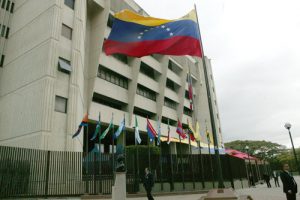
It took the presiding Justice of the Electoral Court, Indira Alfonzo Izaguirre, less than 24 hours to leave an entire state without representation in the National Assembly. PSUV candidate, Nicia Maldonado, challenged the results of the parliamentary elections in the state of Amazonas on December 29, and the next day Alfonzo agreed with her with no regard for the opinion of voters people expressed in the polls on December 6.
Maldonado, former minister of Government, claimed that the governor of Amazonas, Liborio Guarulla (opposition), “bought” votes in favour of their cause. This accusation is based on a recording, obtained illegally, as claimed by the petitioner herself in her submission before the Supreme Court.
“On December 16, 2015, a recording was broadcast by the media, featuring the secretary of the governor of Amazonas, Victoria Franchi, discussing with an anonymous person, about how to pay various amounts money to voters so they would vote for opposition candidates,” explained the PSUV leader in her claim.
The Electoral Chamber, with a presentation by Justice Alfonzo, ruled based on the “broadcast of an audio recording of a conversation between Victoria Franchi Caballero, secretary of the governor of Amazonas, and an unidentified (anonymous) person” and suspended the proclamation of the winners of the parliamentary elections.
The decision by the Supreme Court brought about the first clash of powers even before the new National Assembly took office on January 5, 2016. The popular vote gave the MUD 112 seats, an absolute two-third majority of the House. The ruling of the judges took three seats away momentarily. That “small” subtraction took the two-third majority (a minimum 111 is required) the most powerful majority in Parliament, away from the opposition.
The executive secretary of the MUD, Jesús Torrealba, said that with this ruling “the will of the people is being questioned by some bureaucrats of dubious legitimacy. That is the crux of the problem with this decision by the Supreme Court against all Venezuelans.”
Both the late President Hugo Chavez and his successor Nicolás Maduro reiterated ad nauseam that Venezuela has “the best electoral system in the world” and that its results were indisputable. Maduro signed on October 26, 2015, an agreement in which he undertook to respect the popular verdict on December 6. “It will be sacred,” vowed the Head of State, while the director of the National Electoral Council, Tibisay Lucena, said that elections in Venezuela are “a scientific and highly technical and verifiable process,” as published in the state-owned TV network Telesur.
However, the appeal filed by Maldonado which was accepted by the Electoral Chamber, warns that occurred in Amazonas was “a structural and massive fraud affecting the Venezuelan electoral system».
“They are alleging fraud, and fraud is of an intentional nature, and this intention must be proven. The intention of causing harm to the public trust, for instance in the act of voting, must be proven, but evidence cannot be produced from illegal acts. The ultimate goal of a precautionary contentious appeal is to repeat the elections. But not in all cases, but only in those where the commission of crimes can be proven. Massive fraud has never been proven in our country. There is no element in the current legislation where this is applicable,” warned the legal team of Democratic Unity.
Extract of the judgment
The Court notes uniformity in various print and digital media on December 16, 2015, in a news story involving the broadcast of an audio recording of a conversation between the (…) Secretary of Government of the State of Amazonas, and an unidentified (anonymous) person, discussing the paying of bribes and buying of votes for the so-called Democratic Unity Board (MUD) or to help divert the will of the people requiring assistance to vote; therefore, Jorge Rodriguez, in his capacity as member of the National Leadership of the United Socialist Party of Venezuela, requested the Public Prosecutor to start an investigation accordingly. (…) the Court believes that the public broadcasting of the notorious communicational fact is proof of a serious preliminary presumption of prima facie, or alleged violation of constitutional rights to vote and political participation of voters in the state of Amazonas (…) therefore, (…) it declares the petition for injunction applicable. So it is decided.”